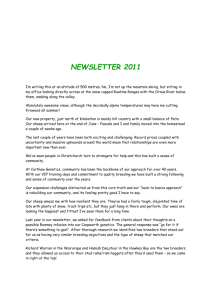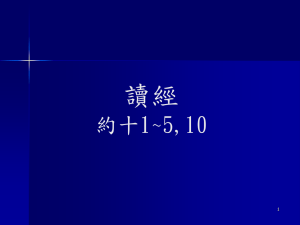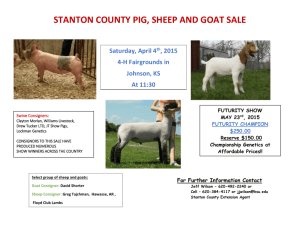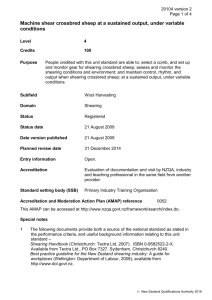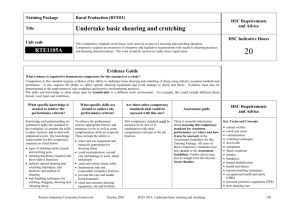Sumfarm ewe productivity trial
advertisement
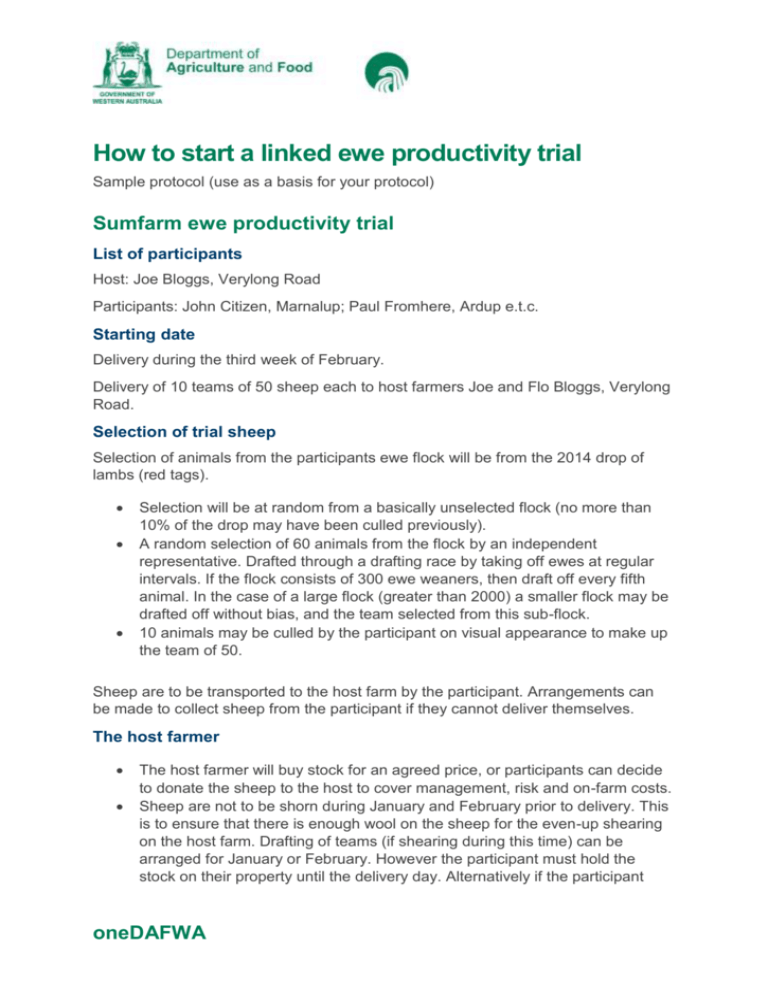
How to start a linked ewe productivity trial Sample protocol (use as a basis for your protocol) Sumfarm ewe productivity trial List of participants Host: Joe Bloggs, Verylong Road Participants: John Citizen, Marnalup; Paul Fromhere, Ardup e.t.c. Starting date Delivery during the third week of February. Delivery of 10 teams of 50 sheep each to host farmers Joe and Flo Bloggs, Verylong Road. Selection of trial sheep Selection of animals from the participants ewe flock will be from the 2014 drop of lambs (red tags). Selection will be at random from a basically unselected flock (no more than 10% of the drop may have been culled previously). A random selection of 60 animals from the flock by an independent representative. Drafted through a drafting race by taking off ewes at regular intervals. If the flock consists of 300 ewe weaners, then draft off every fifth animal. In the case of a large flock (greater than 2000) a smaller flock may be drafted off without bias, and the team selected from this sub-flock. 10 animals may be culled by the participant on visual appearance to make up the team of 50. Sheep are to be transported to the host farm by the participant. Arrangements can be made to collect sheep from the participant if they cannot deliver themselves. The host farmer The host farmer will buy stock for an agreed price, or participants can decide to donate the sheep to the host to cover management, risk and on-farm costs. Sheep are not to be shorn during January and February prior to delivery. This is to ensure that there is enough wool on the sheep for the even-up shearing on the host farm. Drafting of teams (if shearing during this time) can be arranged for January or February. However the participant must hold the stock on their property until the delivery day. Alternatively if the participant oneDAFWA wants to hold the wool from their team then these sheep should be shorn immediately prior to delivery. The host farmer will then take ownership of the stock and bear all costs arising once they are delivered to the property. All income derived from wool grown on host farm shall belong to the host farmer. The group agrees that no exotic sheep shall be run with trial sheep. At the conclusion of trial all remaining trial animals will be sold in a manner at host farmer’s discretion. Animal health and management Animal identification Teams will be tagged with electronic tags. A normal tag that complies with NLIS guidelines will also be fitted. The visual tag numbers for each team will be in sequence (i.e. 1–50 for team one, 51–100 for team two etc). Coloured tags will be used for easier team identification. Host farmer is to organise tags before sheep delivery and tags will be inserted on delivery at the host farm to prevent any misidentification. Animal health treatments Owner/vender stock health declaration and information detailing animal treatments (vaccinations, drenches, mineral supplements, lice & fly treatments etc) must be made available to the host farmer, via the information sheet provided prior to delivery. A nominated independent person or a stock inspector will check for the presence of footrot and lice in each team on arrival to the host farm. Due to this, participants are to endeavour to deliver the sheep on an agreed day ( i.e. on Monday of the third week of February). It is NOT advisable to have different delivery dates for different teams. All sheep will be drenched on arrival with a quarantine drench (combination of drenches) and weighed. Sheep will be drenched to the heaviest bodyweight. For the duration of the trial, worm egg count monitoring will be carried out to determine when sheep should be drenched. All sheep off-shears, to be treated for lice with an insect growth retardant. Even-up shearing This will take place within a month after all sheep in the trial have been delivered. Fleece sampling Fleece sampling (at the mid-side) takes place three weeks before annual shearing to allow testing of wool for yield, fibre diameter and fibre diameter variability traits. Staple strength and length may also be measured, however this should be discussed with participants as this will add extra cost to the host. Annual shearing All the trial sheep will be shorn annually as a separate mob and this should be completed in two days. Individual fleeces must be weighed and preferably valued to give a whole team fleece value. All trial participants are required to assist on the shearing day. Animal management The sheep will be run together as a separate mob at all times except for lambing when they will be split into teams and lambed separately. Husbandry will be the host farmer’s normal management. Ewes will be crutched and drenched prior to lambing, and weighed at mating, pre-lambing (optional), lamb marking (optional) and weaning. Mating Ewes will be mated to experienced rams (host farmers ram source) at 2% for five weeks. A different breed of rams can be used in subsequent years. Length of trial The trial will run for a minimum of three years after which time it will be reviewed. In the first year wool and liveweight traits will be recorded. In the second year ewes will be mated to Merino rams and fertility and maternal traits (reproduction and lamb growth) recorded in addition to wool traits. In the third year ewes will be mated to terminal sires and fertility and maternal traits recorded. Publicity and results Results from trial will be provided to participants as a report after each shearing. The host farmer or his nominee will prepare media articles and submit to all local media as required from time to time. Team results will be identified by participant name in any media release. Participants who don’t want their results published must inform their host farmer. It is expected that participants are actively involved in data collection. This includes body weighing, dag scoring, collection of fleece samples and helping on the shearing day. Trial contacts Host Farmers Joe and Flo Bloggs Ph: +61 0(8) 9812 3456 Email: jfbloggs@someisp.net.au


